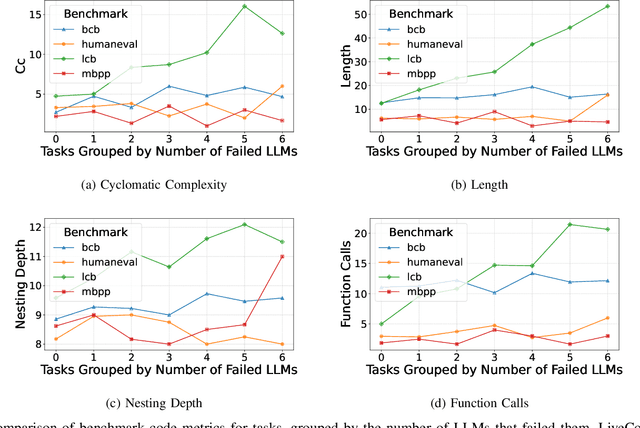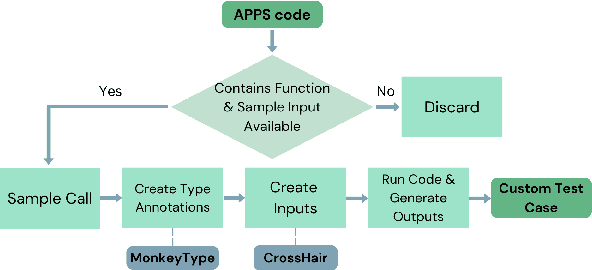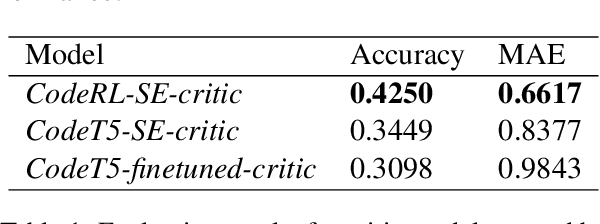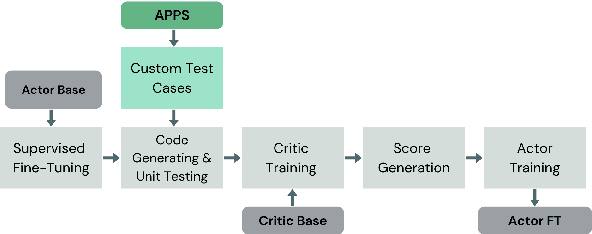Mira Mezini
Analysis of Long Range Dependency Understanding in State Space Models
Jan 19, 2026Abstract:Although state-space models (SSMs) have demonstrated strong performance on long-sequence benchmarks, most research has emphasized predictive accuracy rather than interpretability. In this work, we present the first systematic kernel interpretability study of the diagonalized state-space model (S4D) trained on a real-world task (vulnerability detection in source code). Through time and frequency domain analysis of the S4D kernel, we show that the long-range modeling capability of S4D varies significantly under different model architectures, affecting model performance. For instance, we show that the depending on the architecture, S4D kernel can behave as low-pass, band-pass or high-pass filter. The insights from our analysis can guide future work in designing better S4D-based models.
Where Do LLMs Still Struggle? An In-Depth Analysis of Code Generation Benchmarks
Nov 06, 2025



Abstract:Large Language Models (LLMs) have achieved remarkable success in code generation, and the race to improve their performance has become a central focus of AI research. Benchmarks and leaderboards are increasingly popular, offering quantitative rankings of LLMs. However, they provide limited insight into the tasks that LLMs consistently fail to solve - information that is crucial for understanding current limitations and guiding the development of more capable models. To address this gap, we examined code generation tasks across four popular benchmarks, identifying those that major LLMs are most likely to fail. To understand the causes of these failures, we investigated whether the static complexity of solution code contributes to them, followed by a systematic inspection of 114 tasks that LLMs consistently struggled with. Our analysis revealed four recurring patterns of weaknesses in LLMs, as well as common complications within benchmark tasks that most often lead to failure.
Adaptable Hindsight Experience Replay for Search-Based Learning
Nov 05, 2025Abstract:AlphaZero-like Monte Carlo Tree Search systems, originally introduced for two-player games, dynamically balance exploration and exploitation using neural network guidance. This combination makes them also suitable for classical search problems. However, the original method of training the network with simulation results is limited in sparse reward settings, especially in the early stages, where the network cannot yet give guidance. Hindsight Experience Replay (HER) addresses this issue by relabeling unsuccessful trajectories from the search tree as supervised learning signals. We introduce Adaptable HER (\ours{}), a flexible framework that integrates HER with AlphaZero, allowing easy adjustments to HER properties such as relabeled goals, policy targets, and trajectory selection. Our experiments, including equation discovery, show that the possibility of modifying HER is beneficial and surpasses the performance of pure supervised or reinforcement learning.
BiGSCoder: State Space Model for Code Understanding
May 02, 2025Abstract:We present BiGSCoder, a novel encoder-only bidirectional state-space model (SSM) featuring a gated architecture, pre-trained for code understanding on a code dataset using masked language modeling. Our work aims to systematically evaluate SSMs' capabilities in coding tasks compared to traditional transformer architectures; BiGSCoder is built for this purpose. Through comprehensive experiments across diverse pre-training configurations and code understanding benchmarks, we demonstrate that BiGSCoder outperforms transformer-based models, despite utilizing simpler pre-training strategies and much less training data. Our results indicate that BiGSCoder can serve as a more sample-efficient alternative to conventional transformer models. Furthermore, our study shows that SSMs perform better without positional embeddings and can effectively extrapolate to longer sequences during fine-tuning.
Integrating Symbolic Execution into the Fine-Tuning of Code-Generating LLMs
Apr 21, 2025



Abstract:Code-generating Large Language Models (LLMs) have become essential tools in modern software development, enhancing productivity and accelerating development. This paper aims to investigate the fine-tuning of code-generating LLMs using Reinforcement Learning and Direct Preference Optimization, further improving their performance. To achieve this, we enhance the training data for the reward model with the help of symbolic execution techniques, ensuring more comprehensive and objective data. With symbolic execution, we create a custom dataset that better captures the nuances in code evaluation. Our reward models, fine-tuned on this dataset, demonstrate significant improvements over the baseline, CodeRL, in estimating the quality of generated code. Our code-generating LLMs, trained with the help of reward model feedback, achieve similar results compared to the CodeRL benchmark.
Problem Solving Through Human-AI Preference-Based Cooperation
Aug 15, 2024


Abstract:While there is a widespread belief that artificial general intelligence (AGI) -- or even superhuman AI -- is imminent, complex problems in expert domains are far from being solved. We argue that such problems require human-AI cooperation and that the current state of the art in generative AI is unable to play the role of a reliable partner due to a multitude of shortcomings, including inability to keep track of a complex solution artifact (e.g., a software program), limited support for versatile human preference expression and lack of adapting to human preference in an interactive setting. To address these challenges, we propose HAI-Co2, a novel human-AI co-construction framework. We formalize HAI-Co2 and discuss the difficult open research problems that it faces. Finally, we present a case study of HAI-Co2 and demonstrate its efficacy compared to monolithic generative AI models.
A Critical Study of What Code-LLMs Learn
Jun 17, 2024Abstract:Large Language Models trained on code corpora (code-LLMs) have demonstrated impressive performance in various coding assistance tasks. However, despite their increased size and training dataset, code-LLMs still have limitations such as suggesting codes with syntactic errors, variable misuse etc. Some studies argue that code-LLMs perform well on coding tasks because they use self-attention and hidden representations to encode relations among input tokens. However, previous works have not studied what code properties are not encoded by code-LLMs. In this paper, we conduct a fine-grained analysis of attention maps and hidden representations of code-LLMs. Our study indicates that code-LLMs only encode relations among specific subsets of input tokens. Specifically, by categorizing input tokens into syntactic tokens and identifiers, we found that models encode relations among syntactic tokens and among identifiers, but they fail to encode relations between syntactic tokens and identifiers. We also found that fine-tuned models encode these relations poorly compared to their pre-trained counterparts. Additionally, larger models with billions of parameters encode significantly less information about code than models with only a few hundred million parameters.
Amplifying Exploration in Monte-Carlo Tree Search by Focusing on the Unknown
Feb 13, 2024



Abstract:Monte-Carlo tree search (MCTS) is an effective anytime algorithm with a vast amount of applications. It strategically allocates computational resources to focus on promising segments of the search tree, making it a very attractive search algorithm in large search spaces. However, it often expends its limited resources on reevaluating previously explored regions when they remain the most promising path. Our proposed methodology, denoted as AmEx-MCTS, solves this problem by introducing a novel MCTS formulation. Central to AmEx-MCTS is the decoupling of value updates, visit count updates, and the selected path during the tree search, thereby enabling the exclusion of already explored subtrees or leaves. This segregation preserves the utility of visit counts for both exploration-exploitation balancing and quality metrics within MCTS. The resultant augmentation facilitates in a considerably broader search using identical computational resources, preserving the essential characteristics of MCTS. The expanded coverage not only yields more precise estimations but also proves instrumental in larger and more complex problems. Our empirical evaluation demonstrates the superior performance of AmEx-MCTS, surpassing classical MCTS and related approaches by a substantial margin.
Towards Trustworthy AI Software Development Assistance
Dec 14, 2023Abstract:It is expected that in the near future, AI software development assistants will play an important role in the software industry. However, current software development assistants tend to be unreliable, often producing incorrect, unsafe, or low-quality code. We seek to resolve these issues by introducing a holistic architecture for constructing, training, and using trustworthy AI software development assistants. In the center of the architecture, there is a foundational LLM trained on datasets representative of real-world coding scenarios and complex software architectures, and fine-tuned on code quality criteria beyond correctness. The LLM will make use of graph-based code representations for advanced semantic comprehension. We envision a knowledge graph integrated into the system to provide up-to-date background knowledge and to enable the assistant to provide appropriate explanations. Finally, a modular framework for constrained decoding will ensure that certain guarantees (e.g., for correctness and security) hold for the generated code.
Towards Code Generation from BDD Test Case Specifications: A Vision
May 19, 2023


Abstract:Automatic code generation has recently attracted large attention and is becoming more significant to the software development process. Solutions based on Machine Learning and Artificial Intelligence are being used to increase human and software efficiency in potent and innovative ways. In this paper, we aim to leverage these developments and introduce a novel approach to generating frontend component code for the popular Angular framework. We propose to do this using behavior-driven development test specifications as input to a transformer-based machine learning model. Our approach aims to drastically reduce the development time needed for web applications while potentially increasing software quality and introducing new research ideas toward automatic code generation.
 Add to Chrome
Add to Chrome Add to Firefox
Add to Firefox Add to Edge
Add to Edge